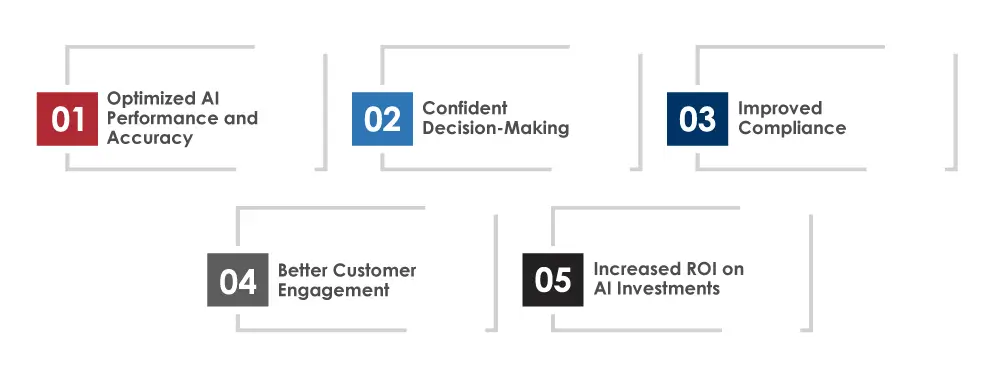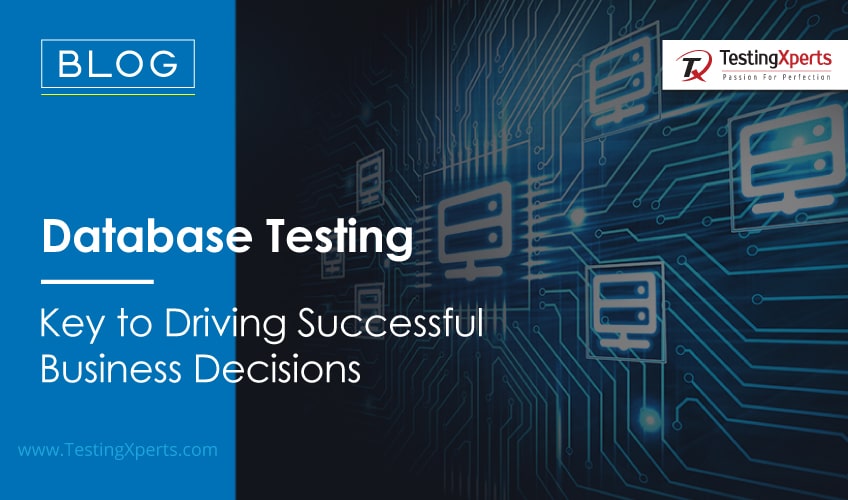
- Data Quality Management (DQM) for AI
- Why does DQM Matter in the AI Era?
- Top 5 Enterprise Fails Caused by Bad Data
- Business Benefits of Strong Data Quality for AI
- How does Tx Approach Data Quality Management (DQM)?
- Summary
In the age of AI-driven decision-making, where businesses rely heavily on data to optimize processes and remain competitive, a small error could result in billions of dollars in losses. One could say that “No Clean Data, No Smart AI. Want AI That Works? Start With Data That’s Worth It.” While enterprises invest heavily in AI/ML models, cloud platforms, and intelligent automation, sometimes they ignore the most basic aspect of AI performance i.e., data quality. According to statistics, businesses face an average of $12.9 million yearly losses due to poor data quality.
As AI transforms how businesses approach decision-making, traditional data quality practices will not be enough to keep up with rising data volumes. No matter how intelligent the AI is, a minor error in data could result in significant operational failures. That’s where enterprise data quality management (DQM) comes in for successful AI initiatives.
Data Quality Management (DQM) for AI
Data quality management (DQM) is a set of operations that helps businesses enhance the quality of data used to train their AI models. It helps ensure data accuracy, completeness, and consistency throughout the lifecycle, from collection to usage.
Its key components include:
Data Governance:
It involves drafting policies and procedures for managing data. Businesses must define roles and responsibilities for data ownership and ensure compliance with industry best practices and standards.
Data Profiling:
This component involves analyzing data to understand its quality and structure. It identifies patterns and anomalies that could cause potential quality issues. This helps in drafting data quality metrics.
Data Cleansing:
This component helps address inconsistencies and duplication issues, ensure data adheres to standards and formats, and improve data accuracy and consistency.
Data Monitoring:
It continuously tracks data quality metrics to identify potential issues and offers stakeholders detailed reports and alerts. This helps enable proactive data quality management at the enterprise level.
Data Validation:
This component checks data quality against pre-defined standards to ensure it meets quality standards before usage. It helps prevent quality issues from becoming more significant issues.
Data Lineage Tracking:
This component records the journey of data (origin, transformation, and usage) to identify the source of quality issues. This helps businesses facilitate data quality improvement efforts.
Why does DQM Matter in the AI Era?
Data is the core aspect of intelligent systems. Every decision and prediction AI makes directly depends on the data it leverages. The aftereffects will be disastrous if the data is incorrect, outdated, biased, or inconsistent. Here’s how data quality management affects an AI model’s performance, accuracy, and quality:
• Adequate data quality ensures AI models perform reliably and accurately, delivering accurate insights and better decisions.
• AI systems use vast datasets to train; if the data is messy, AI will throw unreliable predictions and faulty results.
• High-quality data prevents biases in AI decisions/predictions and helps create fairer models.
• Effective data quality management helps in AI governance by enabling enterprises to check, clean, and monitor their data for reliability and accuracy.
Top 5 Enterprise Fails Caused by Bad Data
Watson’s Failure as a Healthcare Prodigy:
When the Watson Supercomputer beat the world’s best Jeopardy player, IBM started configuring it as a medical tool for cancer treatment. IBM claimed that Watson could recommend effective treatments for cancer patients. However, it turned out to be a non-successful product as it had many QA gaps, such as biased data for model training, inconsistencies in medical data, and much more.
Zoll Medical Defibrillators Quality Issues:
Due to data quality issues, Zoll’s medical defibrillators displayed error messages and even failed during usage. As a result, the company had to launch a Class 1 Recall, an earnest recall request that happens when there’s a possibility of injury or death due to product usage. This led to a loss of $5.4 million in fines and loss of user trust.
The Lehman Brothers Disaster:
In September 2008, the Lehman Brothers triggered a pivotal financial crisis, also known as the largest corporate bankruptcy in US history. This also exposed vulnerabilities in the economic system. Poor data quality, risk assessment, and the lack of accurate data masked the actual value of liabilities and assets. The result? $691 billion of assets were lost, which triggered the bankruptcy, leading to global financial crises and unemployment.
Boeing 737 Max Crashes:
Two Boeing 737 Max airplanes crashed in 2018 and 2019, killing hundreds of people onboard. The reason behind these crashes was the new automated flight control system, which relied on data coming from a single angle-of-attack sensor. The faulty data from the sensor triggered the system and overrode pilot controls, resulting in the crashes. After the incident, all 737 Max were grounded worldwide, causing Boeing to lose $18 billion.
The Cost of Skewed Data:
In 2014, Amazon launched its AI-based recruitment tool to analyze resumes before sending the best candidate recommendation to the hiring department. Ideally, the system would give the top five candidates’ resumes among 100 for recruitment. However, later, it was found that the system preferred male candidates over female candidates. After the incident came to light, Amazon discontinued using this project as it was impacting its reputation.
Business Benefits of Strong Data Quality for AI


While poor data quality can negatively impact your AI model’s performance, high-quality data will do the opposite. Here’s how DQM can assist you in unlocking the full potential of your AI investment in today’s competitive business market:
Optimized AI Performance and Accuracy:
Businesses can fetch clean, well-labeled, and consistent data to train their AI models, enabling them to make accurate predictions. Quality data will optimize AI’s intelligence to decrease the chances of misfires in cases such as recommendation algorithms, fraud detection systems, or customer chatbots.
Confident Decision-Making:
True data is the basis for business decision-making. When leaders want to rely on AI-driven insights, they must consider the data quality. By running AI on solid information, speed and precision will go in parallel. This will enable quicker and smarter decisions across the enterprise.
Improved Compliance:
Accurate and traceable data is a top priority in the banking, finance, and healthcare industries. A strong data quality management framework ensures information is audit-ready, ethical, and compliant with data privacy laws and industry regulations.
Better Customer Engagement:
Relevance and personalization are the top metrics today’s customers look for. Clean data enables AI systems to offer tailored experiences, predict needs/trends, and respond proactively. This improves customer loyalty and lifetime value.
Increased ROI on AI Investments:
Quality data enables AI solutions to perform optimally. DQM reduces the time, effort, and cost spent on model retraining and error remediation, ultimately boosting AI investments. Having clean data ensures enterprises that their AI programs have a sustainable value.
How does Tx Approach Data Quality Management (DQM)?
At Tx, we understand the importance of data quality for the success of AI systems. Our enterprise-level data quality management approach ensures your data is accurate, consistent, and AI-ready. Here’s how we can help you take control of your data quality:
Cleansing and Standardization:
We clean and preprocess datasets to ensure completeness, accuracy, and alignment with your business rules.
AI Workflow Integration:
Our quality engineering teams integrate DQM seamlessly into your AI/ML pipelines to ensure your model gets trained on reliable data.
Bias Detection:
We conduct a thorough analysis to identify and eliminate hidden biases in datasets, ensuring your AI models remain compliant, ethical, and fair.
Data Governance and Traceability:
Our enterprise-wide data governance approach gives you complete visibility and control over data lineage and compliance.
Continuous Monitoring:
We proactively monitor your data quality and prevent decay by implementing robust system checks.
Summary
In today’s AI-driven world, data quality is a top priority. Poor data leads to faulty AI, lost revenue, and reputational damage. Enterprise Data Quality Management (DQM) ensures reliable, accurate, and bias-free data that drives smarter decisions, regulatory compliance, and better CX. By partnering with Tx for data quality services, you can ensure the credibility and reliability of your AI models. In our mission to offer quality data for smarter AI, we empower enterprises with access to clean and consistent data. Remember, “No clean data, no smart AI. If you want AI to work for you, start with data that’s worth it.” Contact our experts now to know more about Tx data quality management services.
Discover more
Get in Touch
Stay Updated
Subscribe for more info






